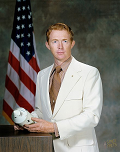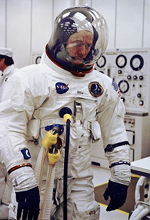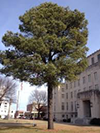Stuart Roosa: Former Military Pilot and Astronaut
Stuart Roosa was a former Air Force and astronaut who orbited the Moon as part of the Apollo 14 mission. 
He was born on Aug. 16, 1933, in Durango, Colo. His family moved to Claremore, Okla., and Stuart graduated from Claremore High School in 1951. He went to college at Oklahoma State University, the University of Arizona, and the University of Colorado and received from the last of those a bachelor of science degree in aeronautical engineering. Among his early experience was working as a smoke jumper for the Forest Service in Oregon. Roosa joined the Air Force in 1953 and flew jet aircraft at several air force bases, including Olmstead AFB in Pennsylvania and Langley AFB in Virginia. He graduated from the Aviation Cadet Program at Williams AFB in Arizona and eventually logged 5,500 hours of flying time. He was a test pilot at California's Edwards Air Force Base in 1965 and 1966. The National Aeronautics and Space Administration named him to Astronaut Group 5 in 1966. He began as a crew support for Apollo 9 and then served as Command Module Pilot for Apollo 14, the third manned mission on the Moon, which launched on Jan. 31, 1971. 
Just after the crew left Earth orbit, the crew set about docking the Command Service Module (CSM), Kitty Hawk, and the Lunar Module, Antares but discovered that the docking latches didn't work. They tried five times without success, resorting to firing the CSM's thrusters in a burst that ended up nudging the two craft together and locking the latches. With that maneuver achieved, the crew settled in for a few days of space travel. Roosa orbited the Moon 34 times while his crewmates, Alan Shepard and Edgar Mitchell, performed tasks on the lunar surface. Their return to Earth was uneventful, and they splashed down on February 9. They endured 17 days of quarantine and were the last Apollo crew to have to do that. Roosa served as backup pilot for both Apollo 16 and Apollo 17 and, when funding for further Apollo missions was cut, transitioned into the Space Shuttle program. He retired from both NASA and the Air Force in 1976 and then went into work in the private sector, served as executive in real estate and manufacturing companies. 
Roosa died on Dec. 12, 1994. He had married Joan Barrett; the couple had four children. Hearkening back to his earlier interest in forestry, he took 50 tree seeds on the Apollo 14 mission. Among the species represented were the Douglas fir, loblolly pine, redwood, sweet gum, and sycamore. Later, the seeds were distributed around the world. One of the trees was planted at Arlington National Ceremony in Roosa's honor. |
|
Social Studies for Kids
copyright 2002–2026
David White



 The crew brought back rocks from the lunar surface, including the famous Big Bertha, at 20 pounds the third-largest Moon rock retrieved; in 2019, scientists concluded that the rock was 4 billion years old and that it probably originated on Earth.
The crew brought back rocks from the lunar surface, including the famous Big Bertha, at 20 pounds the third-largest Moon rock retrieved; in 2019, scientists concluded that the rock was 4 billion years old and that it probably originated on Earth.
